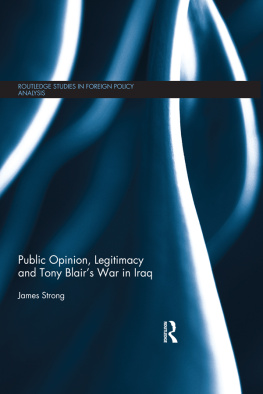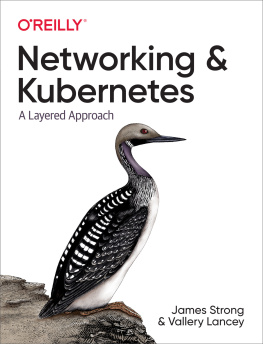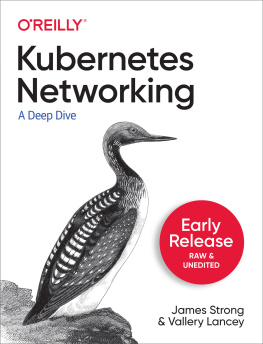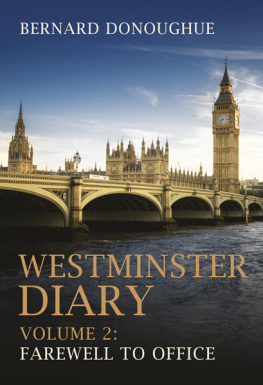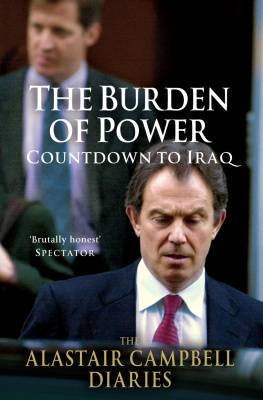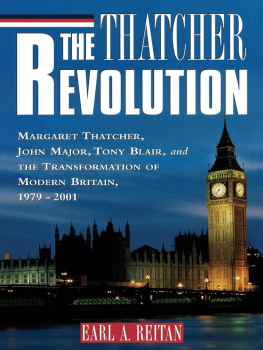Public Opinion, Legitimacy and Tony Blairs War in Iraq
Strongs book is excellent, pushing our understanding of the relationship between public opinion and foreign policy in novel directions. The research is rigorous and well-grounded in theory and methods. I highly recommend it, to scholars, students, and any readers interested in democratic politics, British foreign policy, or the legitimacy of international interventions.
Juliet Kaarbo, Professor, Politics and International Relations, University of Edinburgh, UK
In the wake of the publication of the Chilcot report, this book reinterprets the relationship between British public opinion and the Blair governments decision- making in the run-up to the 2003 invasion of Iraq. It highlights how the government won the parliamentary vote and got its war, but never won the argument that it was the right thing to do. Understanding how, why and with what consequences Britain wound up in this position means understanding better both this specific case and the wider issue of how democratic publics influence foreign policy processes.
Taking an innovative constructivist approach to understanding how public actors potentially influence foreign policy, Strong frames the debate about Iraq as a contest over legitimacy among active public actors, breaking it down into four constituent elements covering the necessity, legality and morality of war, and the governments authority. The book presents a detailed empirical account of the British public debate before the invasion of Iraq based on the rigorous interrogation of thousands of primary sources, employing both quantitative and qualitative content analysis methods to interpret the shape of debate between January 2002 and March 2003.
Also contributing to the wider foreign policy analysis literature, the book investigates the domestic politics of foreign policy decision-making, and particularly the influence public opinion exerts; considers the domestic structural determinants of foreign policy decision-making; and studies the ethics of foreign policy decision- making, and the legitimate use of force. It will be of great use to students and scholars of foreign policy analysis, as well as those interested in legitimacy in international conflict, British foreign policy, the Iraq War and the role of public opinion in conflict situations.
James Strong is a Fellow in Foreign Policy Analysis and International Relations in the Department of International Relations at the London School of Economics, UK.
Routledge Studies in Foreign Policy Analysis
Series Editors: Christopher Alden
London School of Economics, UK
and
Amnon Aran
City University of London, UK
www.routledge.com/series/RSIHR
The Foreign Policy Analysis (FPA) series covers a broad intellectual canvas, which brings together scholars of International Relations, Area Studies, Politics, and other related fields such as Political Psychology and Administrative Studies. It also engages with a wide range of empirical issues: from the study of the foreign policy of individual countries, to specific aspects of foreign policy such as economic diplomacy or bureaucratic politics, through germane theoretical issues such as rationality and foreign policy. The Series aims to specialize in FPA as well as appeal to the wider community of scholars within International Relations, related fields, and amongst practitioners. As such the range of topics covered by the Series includes, but is not be limited to, foreign policy decision- making; the foreign policy of individual states and non- state actors. In addition it will include analytical aspects of foreign policy, for instance, the role of domestic factors; political parties; elites. Theoretical issue- areas that advance the study of foreign policy analysis, for example, FPA and Gender, Critical FPA, FPA in a new media landscape, Ethics and FPA, are also be welcomed.
Public Opinion, Legitimacy and Tony Blairs War in Iraq
James Strong
Forthcoming:
Colombian Agency and the Making of US Foreign Policy
Intervention by Invitation
Alvaro Mendez
Power, Perception and Foreign Policymaking
US and EU Responses to the Rise of China
Scott Brown
First published 2017
by Routledge
2 Park Square, Milton Park, Abingdon, Oxon OX14 4RN
and by Routledge
711 Third Avenue, New York, NY 10017
Routledge is an imprint of the Taylor & Francis Group, an informa business
2017 James Strong
The right of James Strong to be identified as author of this work has been asserted by him in accordance with sections 77 and 78 of the Copyright, Designs and Patents Act 1988.
All rights reserved. No part of this book may be reprinted or reproduced or utilized in any form or by any electronic, mechanical, or other means, now known or hereafter invented, including photocopying and recording, or in any information storage or retrieval system, without permission in writing from the publishers.
Trademark notice: Product or corporate names may be trademarks or registered trademarks, and are used only for identification and explanation without intent to infringe.
British Library Cataloguing in Publication Data
A catalogue record for this book is available from the British Library
Library of Congress Cataloging in Publication Data
A catalog record for this book has been requested
ISBN: 978-1-138-20071-5 (hbk)
ISBN: 978-1-31551-401-7 (ebk)
Typeset in Times New Roman
by Wearset Ltd, Boldon, Tyne and Wear
This book exists thanks to the kindness and active assistance of numerous family members, colleagues, students and friends, and their patient endurance through eight years of research. Dad and Paul helped pay my way through the PhD. Mum and Steve, Katie and the Old Folk offered moral and practical support. John Kent supervised my thesis, Toby Dodge mentored me through my fellowship, Inez von Weitershausen was a great research assistant and Chris Alden suggested I submit this manuscript to Routledge, where Lydia de Cruz guided me through the process and three reviewers offered helpful feedback. Caro blazed the trail I now follow. Karina made the final stages vastly more worthwhile. My students kept me entertained, and LSE kept me employed, while I wrote. Numerous other kind souls read extracts, offered guidance and advice and simply showed the way. Thank you all. Any errors, omissions and other shortcomings remain very much my own.

